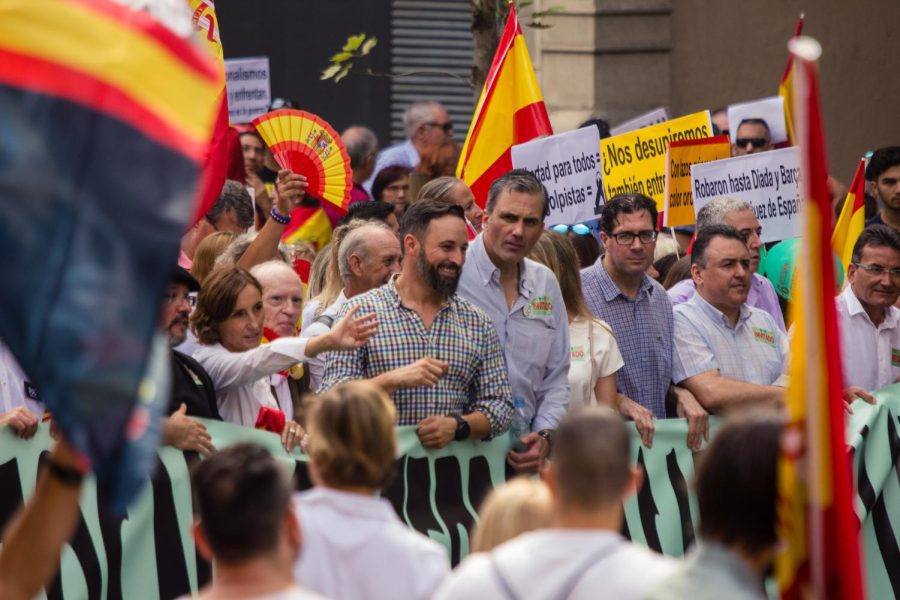Opinion | Andalusian elections will reflect broader attitudes
Photo courtesy of Vox España/Flickr
Santiago Abascal and Javier Ortega Smith along with hundreds of VOX militants participat in a demonstration in Barcelona on Sept. 9, 2018. Senior columnist Andrew Prozorovsky argues that if Vox, a right-wing extremist party in Spain, are to win in the upcoming elections in Spain then the country is next to give in to right-wing nationalists.
Jun 10, 2022
Throughout history, it is plain to see the ghosts of the past perpetually affect the present. Conversely, it is easy to observe how forgetting important lessons from history dooms a society to commit the same mistakes.
It’s true in the United States. Right-wing factions have assailed schools in an attempt to sanitize the American history curricula. The critical race theory panic can at best be described as a neo-nationalist movement that whitewashes the stains that threaten the notion of American exceptionalism. Except there is nothing exceptional about refusing to confront one’s past.
In Europe, the honeymoon period is also sunsetting. For decades after World War II and a continental collapse into fascism, Europe was wary of any right-wing nationalism. In the last few years, right-wing parties have begun to perform well again in countries like Poland, Italy, Germany and the United Kingdom. Although France recently handily rejected right-wing candidate Marine Le Pen, she still advanced to the runoff.
This new wave of European right-wing nationalism presents problems not only for the countries themselves but also endangers the unity of the European Union and NATO. Poland and Hungary have already demonstrated the harmful effects of authoritarianism on the entire European continent.
Since the end of Francoist Spain in 1975, Spain also has refuted right-wing extremism, until now. In March, Vox, Spain’s right-wing extremist party, received an invitation from the People’s Party to form a coalition in the region of Castilla y León, marking its debut as a regional governing power.
Get The Daily Illini in your inbox!
Vox is a controversial force. They champion nationalistic populism and have borrowed a number of policies, strategies and mantras from various right-wing sects, including Donald Trump’s MAGA movement. They intend to severely curtail immigration and eradicate Islamic fundamentalism, which more than likely requires profiling and targeting of Muslims in Spain — a country with a rich Islamic history. They oppose abortion and view feminist movements to be a persecution of men.
Furthermore, Vox opposes the heavily decentralized structure of the Spanish government, which is outlined in Spain’s own constitution. If the party were to perform well enough nationally, it would dismantle the separatist movements like the Catalan independence movement or the Basque nationalist movement.
Unfortunately, Vox appears to be resonating with farmers and radicalized youth, who are less informed on the atrocities of Franco’s regime and more disillusioned with years of centrist and socialist rule.
Vox doesn’t distance itself from the Franco years, it glorifies them. A common Vox slogan, “make Spain great again,” undoubtedly refers to the days of the dictatorship.
Opponents of Vox see the party’s pursuit of a “reconquest” as an example of how Spain never adequately reconciled with its past or the victims in it. A Spanish post-Franco truth commission was only formed as recently as 2018, and ongoing exhumations of Franco-era mass graves have been criticized by Vox.
In Andalusia, regional elections will be held on June 19. If the PP fails to secure a majority of the parliament, Andalusian President Juan Manuel Moreno knows he will have to form a coalition with Vox. In 2018, Vox won 12 seats with 11% of the vote, after being previously unseated in the regional parliament.
Presently, the formed government is between the center-right PP and the center-right Ciudadanos. However, the relationship has collapsed and fresh polls indicate that if elections were held today, Ciudadanos would suffer losses.
This would leave the PP with two options if it cannot govern alone: govern with the socialist PSOE — who is ideologically opposed to the PP — or work with Vox. Regardless, the election has forced PP to take more conservative stances. This election will be quite consequential.
Moreno called elections five months before they would be automatically triggered. Ostensibly, his decision was based on a desire to swiftly pass a 2023 budget that would address high inflation and economic turmoil. But, as it goes in parliamentary systems, there is also the argument that elections were called right when favorable polls indicate gains for one’s party.
Here in Granada, regional Vox leader Macarena Olona’s face is plastered on various bus stops and street advertisements. Olona is a traditionalist who opposes “the LGBT lobby” and remedies to gender-based violence. She is also a right-wing radical who accused the Spanish government of perpetrating genocide in its handling of COVID-19.
Andalusia’s election will again be a gauge of European sentiment, one of the first tests after both the pandemic and economic hardships caused by retaliatory sanctions for Russia’s invasion of Ukraine.
If Vox is allowed to govern with PP, it will define a trend of Spain’s right-wing growing national popularity. More broadly, it would signal that Spain may be the next European nation to succumb to right-wing nationalists. It also highlights the paramount importance of public education accurately recounting history and endowing the newer generations with past wisdom.
The first debate occurred recently, with contentious moments for all six candidates. Keep a vigilant eye on Andalusia in June.
Andrew is a senior in LAS.






